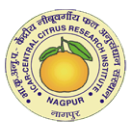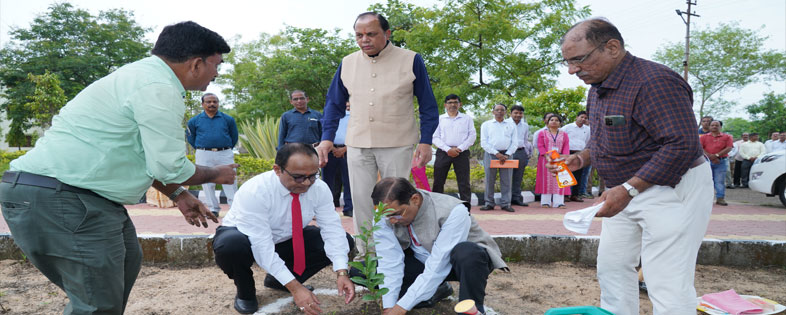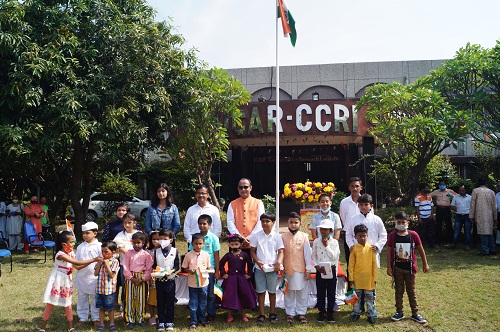
The task force appointed by the Ministry of Agriculture, Government of India suggested urgent need of strengthening of research on citrus in Central India after their survey during 24th to 26th April, 1980. Further, Dr. D.J. Hutchison, and UNDP consultant on citrus recommended the establishment of Citrus Research Station at Nagpur to investigate problems concerning citrus fruits in Central India. The Maharashtra Government also requested the Director General, Indian Council of Agricultural Research (ICAR) for establishment of a Citrus Research Station at Nagpur. Similarly, quinquennial review team (QRT) of IIHR, Bangalore also recommended that the citrus research work conducted at Nagpur will be more useful and applicable. Consequently, ICAR agreed for the establishment of the Research Station at Nagpur under IIHR, Bengaluru in VI Plan.
A committee constituted by ICAR selected suitable land at Nagpur for establishing Central Citrus Research Station and Government of Maharashtra agreed to provide the 250 acres land for the station to be established during VII Plan. Finally, on 29th July, 1985 the foundation stone of the Central Citrus Research Station was formally laid by Sh. P.V. Narasimha Rao, the then Hon'ble Minister of Defence, Government of India and Centre started functioning from 29th November, 1985. On 1st April, 1986 the status of Central Citrus Research Station which was functioning under IIHR, Bangalore was upgraded to independent National Research Centre for Citrus with an outlay of Rs.74.00 lakhs in VII Plan.
Initially Centre started functioning from part of the building of rabbit breeding Centre of the Veterinary College at Seminary Hills, Nagpur which was under Dr. PDKV, Akola. The Centre was slowly established in this old building which was suitably renovated for laboratories, office of the Director and administration. Initially, Pathology, Entomology, Horticulture and Post-harvest Technology laboratories were established. During the 10 years period i.e. from 1986-87 to 1997, the Centre was having well developed laboratories at this site.
Research experiments were laid in farmers field as the Centre was not having its own plantation. The Centre acquired 250 acres land on lease basis at Amravati Road from Government of Maharashtra during 1986-87 and thereafter layout and citrus plantation started from 1988-89 onwards at this new site. The construction of Administrative - cum - Laboratory building was also started.
ICAR-CCRI, Nagpur has completed thirty-two years of its existence. Although National Research Centre for Citrus (NRCC), Nagpur started its journey from April, 1986, the process of its birth had already begun in July 28, 1985 when foundation stone was laid at the hands of the then Hon'ble Shri P.V. Narshimharao, the then Defence Minister of India. It was the culmination of lot of surveys and recommendationby the scientific community and public outcry due to "Kolshi" black fly menace. Initially it started as Central Citrus Research Station - a substation of IIHR, Bengaluru on 29 November, 1985 with Dr. D. G. Dhandar as an Officer In-charge till 23.02.1987. Dr. R. R.Kohli was the acting Director during 1987 to 1988. The Centre was operational from the hired building at Seminary Hills, Nagpur for initial ten years (1985-1996). The original spade work accomplished during his tenure had provided a sound ground for faster development of the Centre that can not be over emphasized.
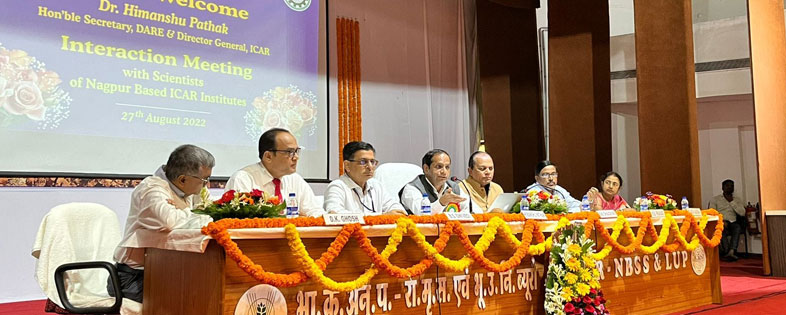
nitial 8 to 10 years witnessed development like farm layouts and plantation, water conservation facilities, infrastructure development, screen houses, admin-cum lab building, equipping the laboratories, residential complex, recruitment of staff etc.
Early years of NRCC under the founder Director, Dr. H. C. Das during August, 1988 to April, 1996 were the formative years for NRCC. The experimental farm with largely underground irrigation system and well planned layouts for plantation were developed during that period.
Dr. R. R. Kohli had a short stint between May 1996 to April 1997 as an acting Director. During this period Centre shifted from Seminary Hill to its own Amravati Road site. Dr. Shyam Singh took over as a Director in April 1997.
The Centre further progressed in the late nineties and early part of first decade of 21st Century yielding significant results mainly because of the strong foundation laid down earlier. The Centre witnessed all-round progress, exposition, academically and public under the dynamic leadership of Dr. Shyam Singh who would pursue the matter till its end. More than a decade's stewardship of Dr. Singh was prominently dotted with three major programmes of Lab to Land extension programmes on large scale and release of publications, Nursery activities and Rejuvenation of declinedorchards.
The baton exchanged the hands again in August 2008, the best efforts were made to strengthen the ongoing activities with few additions. Dr. V. J. Shivankar became the Director in August 2008. While several programmes came to their logical ends, the others have been launched.
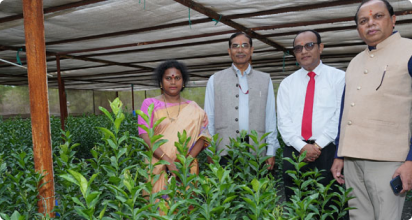
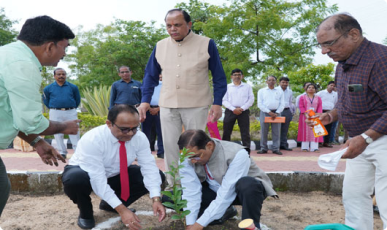
The Centre's development was witnessed and appreciated by the state authorities and many other visiting luminaries. The internet connectivity was extended to all the laboratories and administrative sections. All the scientific, technical, administrative and skilled supporting staff was encouraged for specialized training under HRD initiatives.
The less seeded Nagpur mandarin and rootstock Alemow were made public. The Technology Mission on Citrus programme was actively extended to Mosambi area of Marathwada and citrus areas of Chhindwara distt. of Madhya Pradesh. The production of elite planting material was taken to new heights. Emphasis was also given on transfer of technology in NEH region. The presence of NRCC in NEH region is being increasingly felt at number of places and states. The Center’s efforts in Hindi Rajbhasha were also recognized by the Council at National level and its publication “SantraSanwad” received “Genesh Shankar Vidyarthi” award for best Hindi Patrika of the ICAR in 2012.
Dr. V.J. Shivankar superannuated in August, 2013 and Dr. M. S. Ladaniya took over as the next Director in September, 2013.
With implementation of XII Plan during 2013-14, the most important happening took place and it was transfer of AICRP on Citrus to NRCC, Nagpur, which was an historical event.The Centre has come of age and has now a several feathers in its cap. During 2014, the NRCC has been upgraded to the level of Central Institute and now renamed as ICAR-Central Citrus Research Institute. Another important achievement of the Institute has been award of ISO 9001:2008 Certification and now institute has become ISO 9001:2008 certified organisation. The Institute has introduced several new varieties of Sweet orange, grapefruit, pummelo and mandarin. These varieties are now being grown on raised bed. Varieties like “Flame” and “NRCC Grapefruit-6” of grapefruit; “US-145” and “NRCC Pummelo-5” of pummelo; “NRCC acid lime-7” and “NRCC acid lime-8” of acid lime and “Cutter Valencia” of Sweet orange have been released during 2015 and 2016.
With such a strong inheritance, ICAR-CCRI, Nagpur has a very promising future and challenges to address too.
The new phase of Citrus research in NEH region started when ICAR-CCRI opened its first Regional Research Centre for Citrus (RRCC) at Biswanath Chariali, Assam during March, 2017.
Citrus industry
Presently India is fourth in Citrus production in the world but the country stands first in acid lime and lemon production. India produces 10.76 million metric tonnes citrus fruit annually from 1.40 million ha area.
Average annual growth in terms of increase in area and production of citrus was to the tune of 20% during 1961 to 2012-13. Average productivity of Kinnow is 21.3 metric tonnes per ha as compared to 10 tonnes / ha national average of citrus productivity.
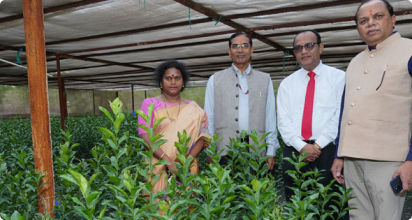
In central India mainly Vidarbha region of Maharashtra and adjoining parts of Madhya Pradesh, Nagpur mandarin (Citrus reticulata Blanco), an easily peelable mandarin locally called as “Santra” is commercially grown since more than 100 years. Coorg mandarin is famous in southern part of the country and mainly grown on hills with cool climate. ‘Khasi’ mandarin have excellent taste, aroma and colour and grown in NEH region since centuries.
Sweet oranges are grown commercially in Andhra Pradesh, Maharashtra, Punjab and Rajasthan. Acid lime is another commercially important citrus crop grown in most states of the country.The citrus is one of the most important fruit crops in the country and this industry provides jobs and livelihood to millions of people. As per conservative estimate, citrus crop worth Rs. 10,000 crores is marketed every year. In Maharashtra alone it is estimated that citrus fruits worth Rs. 1500 crores are traded every year in which Nagpur mandarin has major share.

